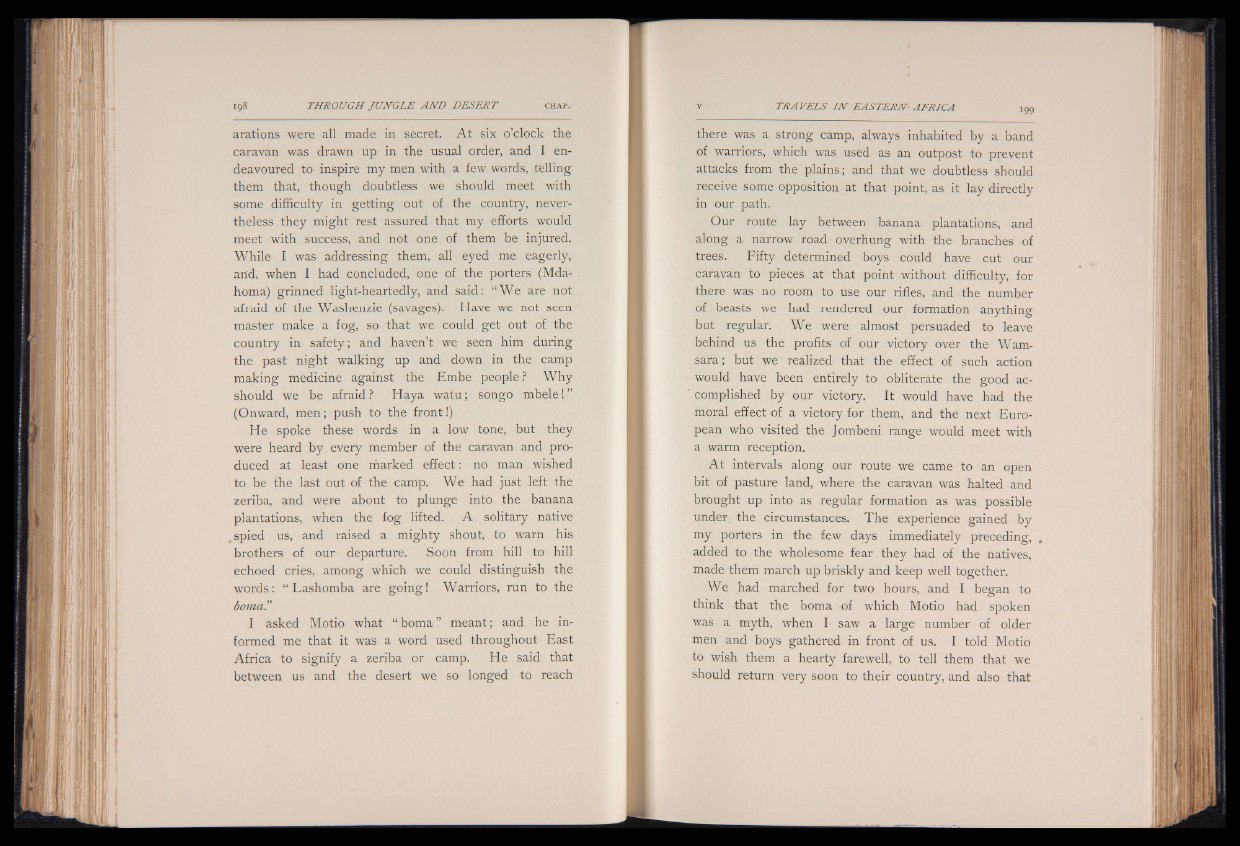
arations were all made in secret. A t six o’clock the
caravan was drawn up in the usual order, and I endeavoured
to inspire my men with a few words, telling
them that, though doubtless we should meet with
some difficulty in getting out of the country, nevertheless
they might rest assured that my efforts would
meet with success, and not one of them be injured.
While I was addressing them, all eyed me eagerly,
and, when I had concluded, one of the porters (Mda-
homa) grinned light-heartedly, and said: “We are not
afraid of the Washenzie (savages). Have we not seen
master make a fog, so that we could get out of the
country in safety; and haven’t we seen him during
the past night walking up and down in the camp
making medicine against the Embe people ? Why
should we be afraid ? Haya watu; songo mbele! ”
(Onward, men; push to the front!)
He spoke these words in a low tone, but they
were heard by every member of the caravan and produced
at least one marked effect: no man wished
to be the last out of the camp. We had just left the
zeriba, and were about to plunge into the banana
plantations, when the fog lifted. A solitary native
spied us, and raised a mighty shout, to warn his
brothers of our departure. Soon from hill to hill
echoed cries, among which we could distinguish the
words: “ Lashomba are going! Warriors, run to the
boma.”
I asked Motio what “ boma ” meant; and he informed
me that it was a word used throughout East
Africa to signify a zeriba or camp. He said that
between us and the desert we so longed to reach
there was a strong camp, always inhabited by a band
of warriors, which was used as an outpost to prevent
attacks from the plains; and that we doubtless should
receive some opposition at that point, as it lay directly
in our path.
Our route lay between banana plantations, and
along a narrow road overhung with the branches of
trees. Fifty determined boys could have cut our
caravan to pieces at that point without difficulty, for
there was no room to use our rifles, and the number
of beasts we had rendered our formation anything
but regular. We were almost persuaded to leave
behind us the profits of our victory over the Wam-
sara; but we realized that the effect of such action
would have been entirely to obliterate the good accomplished
by our victory. It would have had the
moral effect of a victory for them, and the next European
who visited the Jombeni range would meet with
a warm reception.
A t intervals along our route we came to an open
bit of pasture land, where the caravan was halted and
brought up into as regular formation as was possible
under, the circumstances. The experience gained by
my porters in the few days immediately preceding, ,
added to the wholesome fear they had of the natives,
made them march up briskly and keep well together.
We had marched for two hours, and I began to
think that the boma o f which Motio had spoken
was a myth, when I- saw a large number of older
men and boys gathered in front of us. I told Motio
to wish them a hearty farewell, to tell them that we
should return very soon to their country, and also that